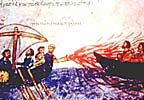 One of my news alerts brought this interesting article about early unconventional weapons to my attention:
One of my news alerts brought this interesting article about early unconventional weapons to my attention:
The first recorded instance of poisoning an enemy's water supply, for example, appeared in the sixth century BC in the Sacred War, when a number of city-states, Athens among them, attacked the Greek harbor town of Kirrha.
"They were besieging this town for having taken advantage of a sacred site, for not respecting the sacred site of Apollo," Adrienne Mayor, author of Greek Fire, Poison Arrows & Scorpion Bombs: Biological and Chemical Warfare in the Ancient World, says. And since the aggressors called it a sacred war, she adds, the label lent a certain justification to the use of the unconventional warfare.
The attackers poured poison into the water supply, sickening its inhabitants and leaving them easy marks for the ensuing full-scale slaughter of defenders and civilians alike. But the victory was tainted by a fair amount of soul-searching throughout Greece.
"The Greeks were horrified after this happened," Mayor says. "They actually agreed not to interfere with the water supply of other Greek city-states."
Roman historians responded similarly to other "unfair" battles, writing that dipping arrows or spears in poison disgraced the very iron used to forge them.
"One of the more gruesome instances occurred in AD 198, when the Romans besieged Hatra, a fortified city between the Tigris and Euphrates rivers in what is now Iraq.
The citizens of Hatra would not be overcome so easily.
"They prepared two forms of surprise weapons on the Roman besiegers," Mayor says. "The first was that they gathered petroleum from the oil fields around Hatra, a substance that would have been virtually unknown in Italy. They would pour burning petroleum down on the Romans, and these fires are unquenchable, there's no way to put them out." The petroleum burned the Romans' weaponry, melted their armor, and incinerated the attackers, forcing the emperor to withdraw his troops. When the Romans returned, the people of Hatra already had gathered scorpions and other poisonous creatures such as assassin bugs from the desert. They filled terra cotta pots with their biological arsenal, in effect creating crude scorpion bombs.
"In a sense, it doesn't even matter how many times the scorpions stung the soldiers," Mayor says. "It's just the horror of having these pots break on your head and having the scorpions crawl on you."
No comments:
Post a Comment